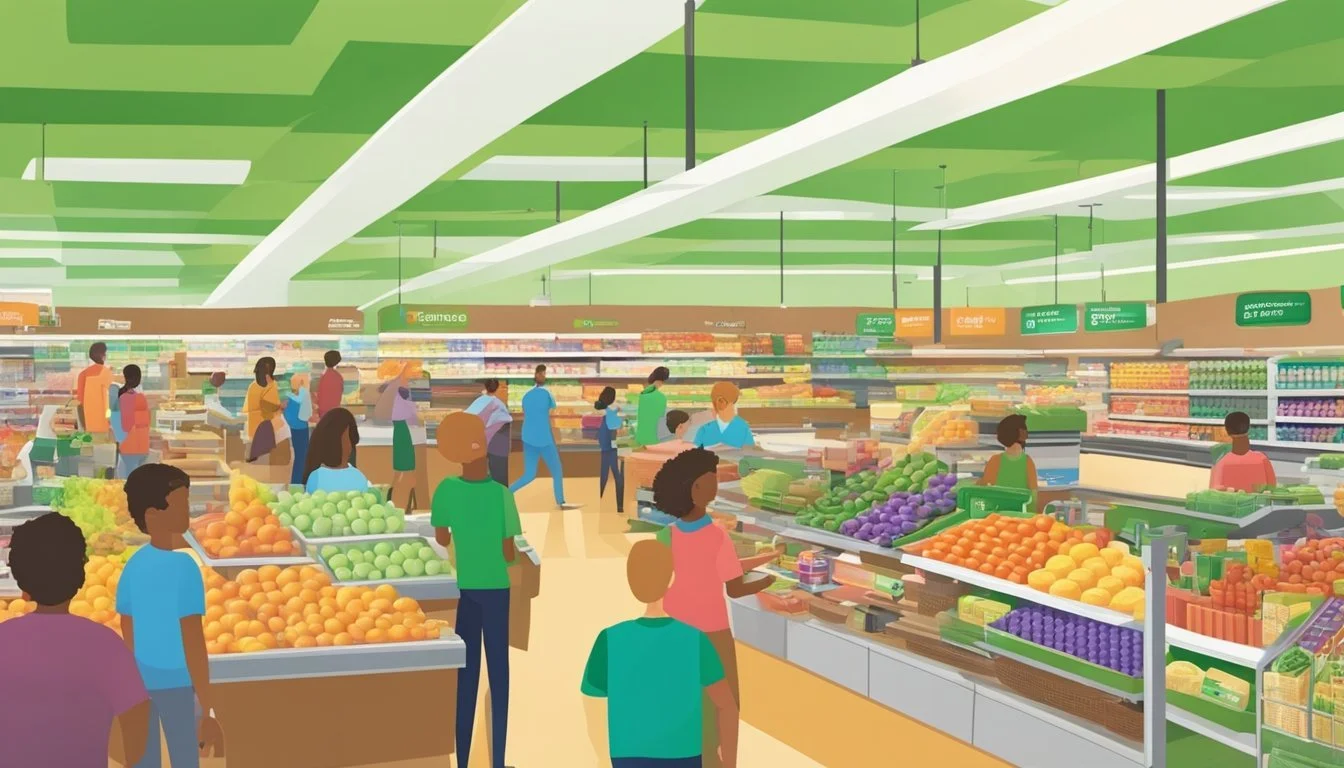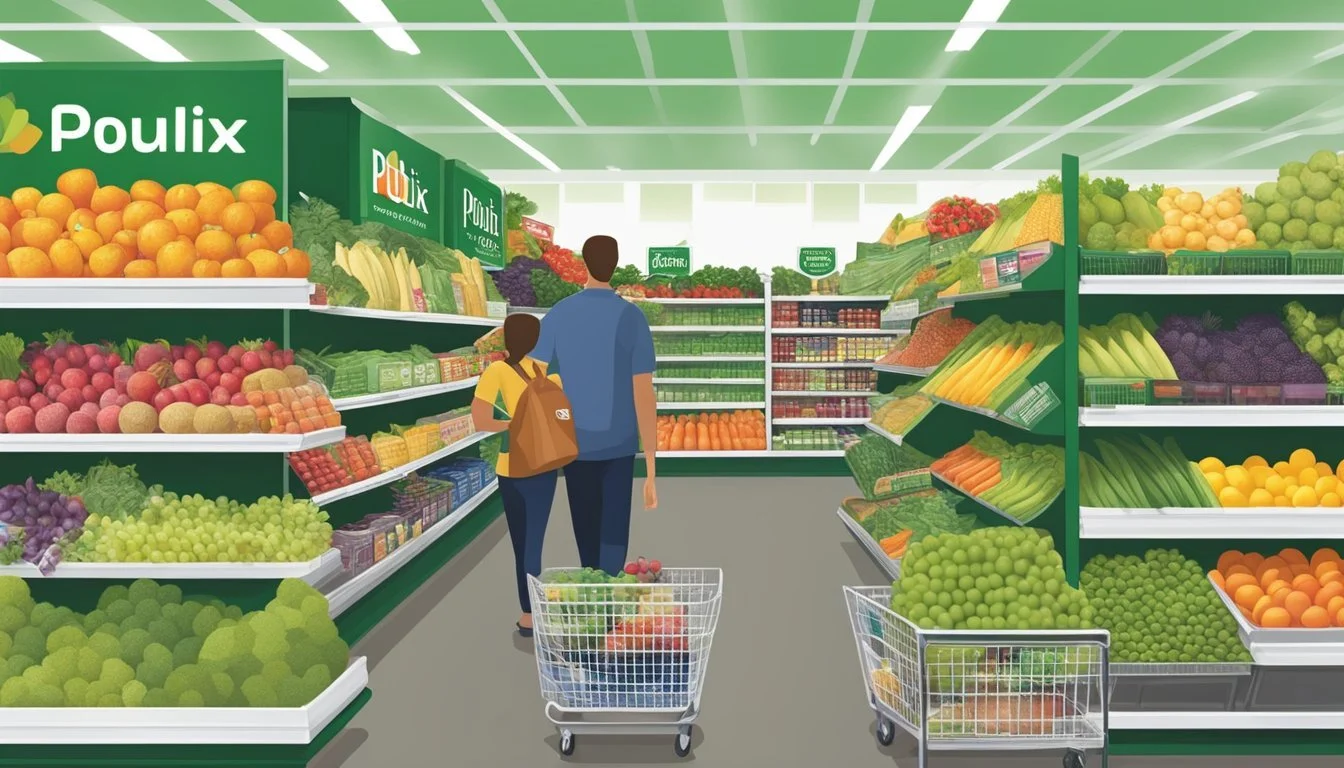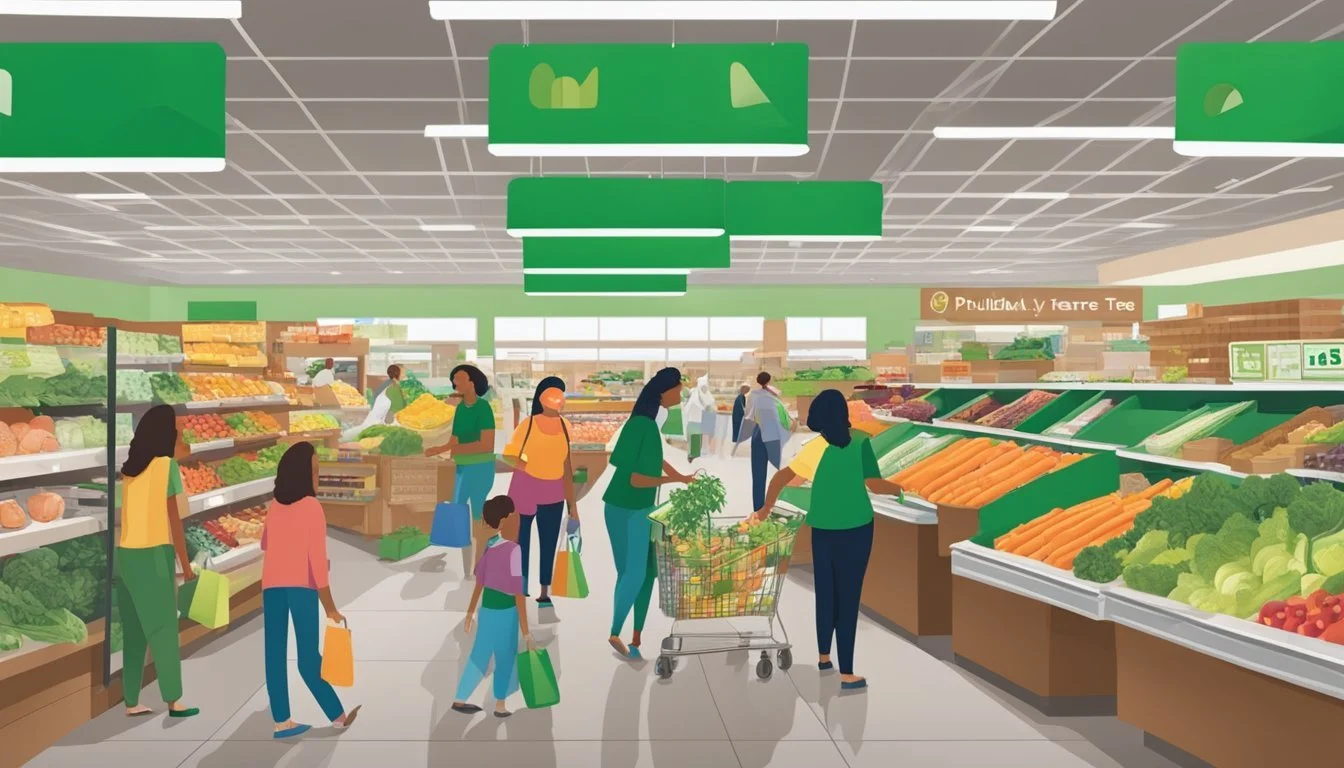Publix vs Harris Teeter
Comparing Prices, Selection, and Shopper Experience
Part of Our Grocery Store Guide with Details on Publix and Harris Teeter
Choosing the right grocery store can significantly impact both one's budget and shopping experience. Harris Teeter and Publix are two prominent grocery chains in the southeastern United States, each with a dedicated customer base and a reputation for certain strengths. Shoppers often debate which store offers the better combination of value, quality, and service. Cost comparison analyses suggest that Harris Teeter generally offers lower prices on a majority of store-brand items compared to Publix, with price differences ranging from 8% to 24%.
However, pricing is just one factor in the grocery shopping experience. Publix is often commended for its customer service and the quality of its personal care items, where it tends to be less expensive than Harris Teeter. Each store has cultivated its own niche, with Harris Teeter emphasizing competitive pricing across most shopping categories, while Publix focuses on providing a customer-centric experience and a wide selection of quality products.
The decision between the two often comes down to individual priorities, whether it's the overall cost savings at the checkout line or the store environment and product selection. Both chains have loyal followings and have received consumer accolades, making the choice a matter of personal preference and shopping priorities.
Company Overview
The grocery store industry sees a constant battle for customer loyalty and market share, with Publix and Harris Teeter being two notable players. Their histories reflect unique paths of growth and service philosophies in the Southern United States.
History of Publix
Publix, officially known as Publix Super Markets Inc., planted its roots in 1930 when George W. Jenkins opened the first store in Winter Haven, Florida. Since then, Publix has grown into one of the largest employee-owned grocery chains in the United States. It operates over 1,200 stores across the southeast, emphasizing a strong commitment to community involvement and customer service. With a reputation for clean stores and quality produce, Publix has created a loyal customer base.
Founded: 1930
Founder: George W. Jenkins
Headquarters: Lakeland, Florida
Number of Locations (approx.): 1,200+
History of Harris Teeter
The story of Harris Teeter begins in 1936 during the Great Depression when William Thomas Harris and Willis L. Teeter founded separate stores in Charlotte, North Carolina. The two merged their operations in 1958 to better serve the community. Since then, Harris Teeter has expanded to include a network of premium grocery stores known for their fresh produce and quality customer service. As a subsidiary of The Kroger Company, Harris Teeter offers a range of grocery items, including an extensive organic selection.
Founded: 1936
Merger: 1958
Headquarters: Matthews, North Carolina
Number of Locations (approx.): 260+
Parent Company: The Kroger Company
Both Publix and Harris Teeter have solidified their presence in the grocery store market through decades of customer service and community engagement. They continue to expand and adapt, catering to evolving customer needs and preferences.
Store Comparison
This section examines the regional presence and store layout of Publix and Harris Teeter, aiming to inform shoppers about the accessibility and shopping experience at each grocery chain.
Store Locations and Regions
Publix primarily serves customers in the southeast of the United States, with a significant presence in Florida, Georgia, Alabama, and the Carolinas. Harris Teeter, on the other hand, operates chiefly in the South Atlantic states, with a dense concentration in North Carolina and Virginia. They are both found in urban, suburban, and locales adjacent to malls, catering to local and regional customer bases.
Publix: Predominantly in the Southeast; over 1,200 stores.
Harris Teeter: Concentrated in the South Atlantic; about 260 stores.
Store Layout and Convenience
Shoppers laud Publix for its well-organized layout and the convenience it provides, with stores designed to facilitate a smooth shopping experience. Harris Teeter offers a similar shopping ambiance, praised for clean aisles and a logical arrangement of products. Both grocery stores typically feature an inviting atmosphere that reduces the hassle typically associated with grocery shopping.
Publix: Known for spacious aisles; a variety of sections such as deli, bakery, and fresh produce.
Harris Teeter: Recognized for clean, intuitive store design; self-checkout options for added convenience.
Product Selection and Quality
When comparing Publix and Harris Teeter, shoppers will find differences in the variety and quality of products offered, with both stores having their distinct advantages across produce, deli, bakery, and store brand options.
Variety of Products
Publix and Harris Teeter both offer a wide range of products catering to diverse customer needs. Publix is known for its expansive selection, particularly in specialty cheeses and international foods. In contrast, Harris Teeter offers a robust variety of choices as well, but shines with its wine selection and condiment varieties.
Quality of Produce
Both grocery chains are committed to providing high-quality produce. Publix frequently receives praise for its fresh produce section, which often includes a plethora of organic options. Harris Teeter also offers fresh produce, with quality and freshness that customers have come to expect, though some reports suggest Publix may edge out Harris Teeter slightly in this category.
Deli and Bakery Offerings
The deli and bakery sections are highlights for both Publix and Harris Teeter. Publix boasts a well-regarded deli with an array of made-to-order sandwiches and a wide variety of deli meats and cheeses. The bakery is famous for its cakes and artisan breads. Harris Teeter's deli counters are noteworthy for their high-quality meats and artisanal cheeses, while their bakery offers a diverse selection of bread, pastries, and desserts.
Store Brand Comparison
Store brands offer value and quality, with both grocery chains featuring their own exclusive lines. Observers note that Publix's store brand products are comparable to national brands in terms of taste and quality. Similarly, Harris Teeter's store brands, such as its SE Grocers line, are lauded for offering national brand quality at lower prices. Products like white sandwich bread and raw chicken are often noted as particularly good values at Harris Teeter.
Pricing and Value
When comparing Publix and Harris Teeter, pricing and value play a significant role in the shopping experience. Customers are keen to understand where they can find the best prices on groceries, as well as the most valuable deals and options for budget shopping.
Comparison of Product Prices
Harris Teeter tends to offer lower prices compared to Publix, with savings ranging from 8% to 24% on a variety of items. For instance, a cost analysis indicated that Harris Teeter's total bill was $97.13, which is $24.56 cheaper than Publix's total of $121.69. However, Publix sometimes offers lower prices in specific categories, such as produce.
Example Product Pricing:
Spinach: Publix offers a lower price.
Store Brand Items: Harris Teeter is generally cheaper.
Deals and Discounts Offered
Both grocery stores provide deals, yet they differ in their approach. Harris Teeter frequently advertises reductions on everyday prices, making it often cheaper even when Publix products are on sale.
Types of Deals:
Harris Teeter: Regular lower everyday prices.
Publix: Sales on specific items (e.g., personal care category).
Budget Shopping
For customers intent on adhering to a strict budget, Harris Teeter offers significant savings for a range of products. Publix, while slightly more expensive overall, may have competitive prices in certain departments like personal care. Shoppers should consider store brand options at both stores to maximize savings.
Budget Shopping Tips:
Compare prices of store brand items.
Look out for sale items in personal care at Publix.
Check for everyday low prices at Harris Teeter.
Shopping Experience
When it comes to shopping at Publix and Harris Teeter, the experience can greatly influence customer preference. Both stores focus on the quality of customer service, the range of shopping services they provide, and the variety of in-store and online options available, all of which shape the overall shopping experience.
Customer Service Quality
At Publix, customer service is paramount, often being recognized for employees who are friendly and willing to assist customers whenever needed. The store has a longstanding reputation for creating a welcoming environment and for staff who go the extra mile to ensure customer satisfaction. Harris Teeter also places a high value on customer service, with staff members known for being attentive and responsive, helping to make the shopping experience pleasant and efficient.
Shopping Services
Harris Teeter offers a number of services to add convenience to the customer’s shopping experience, including online shopping and curbside pickup options. Publix similarly provides a range of services, including in-store pharmacies and cooking schools in certain locations, which aim to enhance the ease and enjoyment of the shopping experience.
Harris Teeter:
Online shopping with curbside pickup.
Pharmacy services.
Publix:
In-store pharmacies.
Cooking Schools (select locations).
In-Store and Online Shopping Options
Both Publix and Harris Teeter have invested in their online presence, offering robust online shopping options. They have easy-to-navigate websites and apps enabling customers to shop online for home delivery or in-store pickup. Publix has a straightforward online system, while Harris Teeter provides a more extensive online service catering to multiple customer preferences for either pickup or delivery, highlighting their commitment to online shopping convenience.
Health and Safety Standards
When comparing Publix and Harris Teeter, it is essential to evaluate their dedication to health and safety standards. This involves examining their approaches to freshness, quality control, and the availability of health-conscious options.
Freshness and Quality Control Standards
Both Publix and Harris Teeter take significant steps to ensure the freshness and quality of their products. They operate under strict quality control standards that align with FDA regulations to provide safe and high-quality goods to consumers. Publix often touts its rigorous product inspection processes, ensuring that perishable items like produce and meat meet high standards before reaching the shelf. Similarly, Harris Teeter prioritizes freshness, particularly in their produce and bakery sections, with clear labeling and handling procedures to maintain quality from farm to store.
Publix: Stringent inspection processes for perishables.
Harris Teeter: Clear labeling practices to ensure product freshness.
Health Conscious Options
Regarding health-conscious options, both grocery stores offer a variety of products catering to specific dietary needs. Publix has an extensive range of organic and gluten-free products, making it easier for customers to make healthier choices. Harris Teeter also shows a commitment to health by providing nutritional information and guidance through their "Yourwellness" tags, helping shoppers identify healthier options on shelves.
Publix: Wide selection of organic and gluten-free items.
Harris Teeter: "Yourwellness" tags for nutritional guidance.
Community and Sustainability Efforts
Publix and Harris Teeter both prioritize community and sustainability efforts, engaging in practices that support local suppliers and the environment. These efforts are integral to their operations, reflecting a commitment to social responsibility.
Local Supplier Support
Publix has a history of partnerships with local farmers and producers, ensuring that a range of local products are available in its stores. This not only supports the local economy but also reduces the carbon footprint associated with long-distance transportation of goods. By integrating local supply chains, Publix enables customers to support their local farmers market through direct purchases at their grocery store.
Harris Teeter also places great importance on local supplier support, stocking local produce and products when available. Harris Teeter's commitment lies in fostering close relationships with local vendors, giving them a platform to reach a larger market.
Environmental Initiatives
Publix has made strides in its sustainability efforts, with a focus on reducing its overall environmental impact. The grocery chain has launched several initiatives to cut down on waste and promote recycling. One such initiative includes implementing energy-efficient lighting and refrigeration systems in stores to reduce energy consumption.
Harris Teeter implements environmental initiatives that emphasize waste reduction and resource conservation. Their stores feature energy-efficient designs and operations. Harris Teeter also offers a selection of sustainable seafood, which ensures that marine resources are responsibly managed.
Both chains continue to adapt and develop more sustainable practices to minimize their impact on the environment and support the communities they serve.
Loyalty Programs and Customer Engagement
Loyalty programs play a significant role in enhancing customer engagement and retention for grocery stores. Both Harris Teeter and Publix have structured their loyalty programs to incentivize and reward their customers, fostering a sense of community involvement through various initiatives.
Rewards Programs
Harris Teeter offers the VIC (Very Important Customer) program, which provides shoppers with weekly specials, electronic coupons, and fuel discounts. Customers accumulate points with each purchase, later redeeming them for discounts on future shopping trips. Additionally, e-VIC benefits include personalized weekly emails tailored to their shopping habits.
Publix operates a program called Club Publix. This program sends personalized deals and discounts to customers’ inboxes, provides digital coupons, and includes a feature to pay with a scan of the Publix app. Club Publix does not utilize a point system but emphasizes ease of use and instant savings at checkout.
Community Involvement
Both grocery store chains demonstrate commitment to their communities beyond just offering savings through loyalty programs.
Harris Teeter engages its customers with initiatives like Together in Education, where a percentage of VIC card purchases goes to schools that customers choose. This not only enhances engagement but also embeds the store into the local community fabric, as customers feel their shopping contributes to local education.
Publix, known for its slogan “Where Shopping is a Pleasure,” extends its community engagement through the Publix Partners program, allowing customers to support local schools through their purchases. It bolsters this engagement with wide-reaching philanthropic efforts such as disaster relief and hunger-alleviation programs.
Through community-focused initiatives and personalized rewards, both Harris Teeter and Publix strive to connect with their customers beyond transactions, enhancing the overall shopping experience.
Final Assessment
When comparing Publix and Harris Teeter, shoppers have noted price differences between the two supermarkets. Harris Teeter typically offers more competitive prices on a variety of items, including store brand products. One analysis suggests Harris Teeter could be 8% to 24% more affordable than Publix in several categories. However, it is worth noting that Publix occasionally presents better deals within the personal care category.
In terms of product range, both supermarkets offer a diverse selection, but the preference may hinge on individual shopping needs. Harris Teeter is perceived to provide substantial savings, especially when purchasing everyday staples.
Quality is a high priority for both supermarkets, with some shoppers feeling that store brands like Winn-Dixie's SE Grocers can rival national brands in taste and quality, potentially 20% cheaper.
Here is a brief comparison of the two entities:
Price Points: Harris Teeter often has lower prices, with exceptions in the personal care and produce departments at Publix.
Quality Perception: Comparable quality with some store brands seen as equivalent or superior to national brands.
Shopper Experience: Varies by location and is subjective to customer preferences.
When individuals select their preferred supermarket, they may consider factors such as proximity, product availability, and customer service. The final choice between Harris Teeter and Publix can be influenced by periodic sales and discounts each chain offers, which may sway the cost-benefit analysis in favor of one or the other at different times.
Additional Resources and References
For an in-depth comparison of Publix and Harris Teeter, readers may refer to the following resources:
Knoji provides a side-by-side brand comparison detailing various criteria such as payment options and discount policies. A comprehensive guide and breakdown are accessible on their website.
Newsweek's 'Most Trusted Grocery Retailers in America' offers a list where consumers can see where Publix and Harris Teeter rank in trustworthiness.
Eat This Not That outlines the best and worst grocery brands, which may include evaluations of Publix and Harris Teeter's store brands.
Investigative articles comparing the two stores' pricing and quality, such as those found on the Low Dough Family blog, give a clear picture of the cost differences consumers can expect.
To extend research, shoppers may also consider:
Visiting the official Publix and Harris Teeter websites for the latest information about products, promotions, and store policies.
Reading customer reviews on platforms like Yelp or Google Reviews for first-hand experiences at local stores.
Exploring financial news sources for any recent developments that might impact either grocery chain’s operating status or customer experience.
These resources will offer readers a well-rounded understanding of the two grocery chains and assist in making an informed decision regarding their grocery needs.





